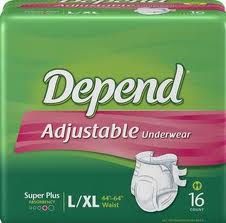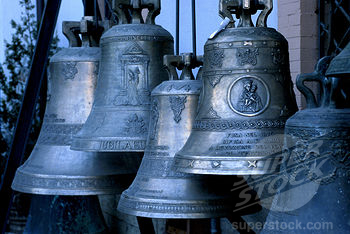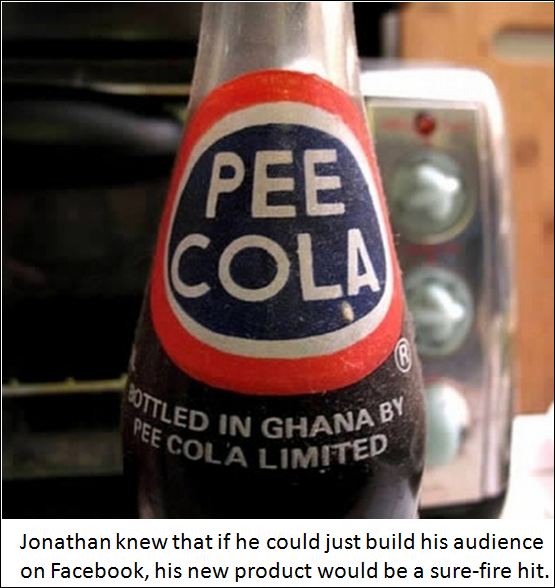By Mark Schaefer
As the hype of social media begins to die down and companies re-evaluate their efforts with a steely-eyed look at the cost versus benefits, I think it is time to re-visit this important question: Does every company really need a social media marketing plan?
This is a very complex question. So to help answer it, I looked at a few companies with brands that might not be natural fits for a social media presence. Adult diapers. Coal. Hazardous waste clean-up. Playing cards.
Let’s explore this important question by taking a romp through some unusual case studies that stretch the boundaries of social media marketing thinking.
Depend Adult Diapers
 Do you need a social media strategy? It depends! Get it? Oh, never mind.
Do you need a social media strategy? It depends! Get it? Oh, never mind.
Depend, a Kimberly Clark brand, has no apparent social media offerings. With its typically geriatric customer base, the product website offers a fitting guide and coupons but no social media way to connect. A company not affiliated with the brand has set up a rogue Facebook site called “Depend’s adult diapers.” So Kimberly Clark probably should protect itself by nailing down as many name alternatives as they can on the most popular social media platforms.
Should they have a social media component? It’s not a conversational brand, is it? I really don’t want to participate in any diaper polls.
However, they should consider at least a modest Facebook outpost because their future customers will certainly be there. Also, more and more people are using Facebook to search for brand information. At least one competitor, Poise, does have a Facebook page.
Should they continue to poo-poo social media?
Coal
 A big argument I hear against getting involved with social media is when a company sells a commodity product. And, there is perhaps no product less differentiated than coal. In a tough business like that, you simply try to excel where you can by managing the supply chain properly.
A big argument I hear against getting involved with social media is when a company sells a commodity product. And, there is perhaps no product less differentiated than coal. In a tough business like that, you simply try to excel where you can by managing the supply chain properly.
I know commenters might argue that there are ways to differentiate any business, but the reality is, usually a contract in this market is won or lost by cutting a few cents per ton. That’s life in a commodity business. Why be on social media?
Peabody Energy is the largest publicly-traded coal company in the world. It has an excellent, informative website, but virtually no social presence (a token Twitter account and a weak Facebook page).
Perhaps Peabody’s strategy is to do whatever they can to avoid social media connection. Let’s face it, any company that scrapes away pristine countrysides to mine a product that is a major contributor to air and water pollution is not necessarily part of a conversation that is shareholder-friendly. Coal is important to the world economy, but it’s a dirty, dangerous business that sparks a lot of emotion in people. Should we support coal energy? It is an argument that will never be settled, and one they can never win. If they had a significant social media presence, the debates and hater harpoons would be endless.
Instead, Peabody can provide financial support to trade organizations like American Coalition for Clean Coal, which has a significant social media footprint — more than 1 million YouTube views, a blog, and a meaningful presence on Twitter and Facebook.
Should a company avoid the cost of social media conversation and move it to a trade association? A viable strategy?
Playing cards
 I play this little marketing mind game with myself. I pick a product and then imagine what their social media presence might be. Like playing cards. What can you really say about those for heaven’s sake? They haven’t changed for centuries.
I play this little marketing mind game with myself. I pick a product and then imagine what their social media presence might be. Like playing cards. What can you really say about those for heaven’s sake? They haven’t changed for centuries.
Turns out, quite a lot.
I opened a new pack of Bicycle playing cards and was delighted to see an extra card promoting their social media properties: Twitter, Facebook, YouTube. These sites are filled with excellent content for people who love card games, card tricks, and even card-related arts and crafts. There are tons of fan conversations going on for this ancient gaming product.
Bicycle has also launched a premium content site called Club 808 that requires a paid subscription. Are there enough card fanatics out there to support something like that? I guess they’ll find out. But it just goes to show that there are content marketing opportunities for even the most common household products.
Bicycle is not a highly conversational brand but this notably non-digital product is finding interesting ways to create new conversations, and renewed relevance, with a digital audience.
Radioactive Waste Removal
 You have to love a company with a tagline of “Providing radioactive waste services since 1952.” Straight to the point. And so is US Ecology, a company specializing in one of the most demanding B2B services on earth.
You have to love a company with a tagline of “Providing radioactive waste services since 1952.” Straight to the point. And so is US Ecology, a company specializing in one of the most demanding B2B services on earth.
The company has no social media presence with the exception of a short LinkedIn page. Let’s think about their business model. Somebody has a radioactive mess on their hands. There is a well-known and short list of qualified and trained people to clean it up. The customer inquires to see who is available and asks them to get there fast. There probably isn’t much of a negotiation.
Or perhaps US Ecology has some long-term contracts with companies who generate radioactive waste. You probably don’t want to pinch pennies in that case, either.
If it doesn’t need Facebook to generate demand or customer connection, does US Ecology need a social media presence to attract and retain employees? Apparently not. I actually met some of their workers a few months ago and they were happy to have the job. They are paid well and the hours are good. There is little employee turnover in their area of expertise.
If you were the marketing director for US Ecology would you spend money on a social media marketing program?
The world’s oldest company
 Fonderia Pontificia Marinelli has been casting beautiful bronze bells continuously in the quiet Apennine Hills of Italy since the year 1000. It is one of the five oldest companies in the world and, in fact, they have been making their bells the same way throughout the centuries.
Fonderia Pontificia Marinelli has been casting beautiful bronze bells continuously in the quiet Apennine Hills of Italy since the year 1000. It is one of the five oldest companies in the world and, in fact, they have been making their bells the same way throughout the centuries.
The bells of Fonderia Pontificia Marinelli toll in the important buildings of New York, Beijing, Jerusalem, South America and Korea. The family business currently employs 20 people, five of them named Marinelli. The company also has a small museum and hosts special events.
They have a basic website circa 2000 and no social media presence. That doesn’t mean that their content is not being shared by social media savvy visitors from throughout the world, but the old ways seem to suit this family business best.
Fonderia Pontificia Marinelli has made it through wars, natural disasters, and economic calamities without fail. Can it keep going without a social media strategy? If you are looking for an epic bronze bell, would you buy from this company, even if they didn’t have a Facebook page?
Somehow, I think they will outlast us all.
So what do you think? Does every company need a social media strategy? Any of these case studies ring your bell?
 Mark Schaefer is the chief blogger for this site, executive director of Schaefer Marketing Solutions, and the author of several best-selling digital marketing books. He is an acclaimed keynote speaker, college educator, and business consultant. The Marketing Companion podcast is among the top business podcasts in the world. Contact Mark to have him speak to your company event or conference soon.
Mark Schaefer is the chief blogger for this site, executive director of Schaefer Marketing Solutions, and the author of several best-selling digital marketing books. He is an acclaimed keynote speaker, college educator, and business consultant. The Marketing Companion podcast is among the top business podcasts in the world. Contact Mark to have him speak to your company event or conference soon.



